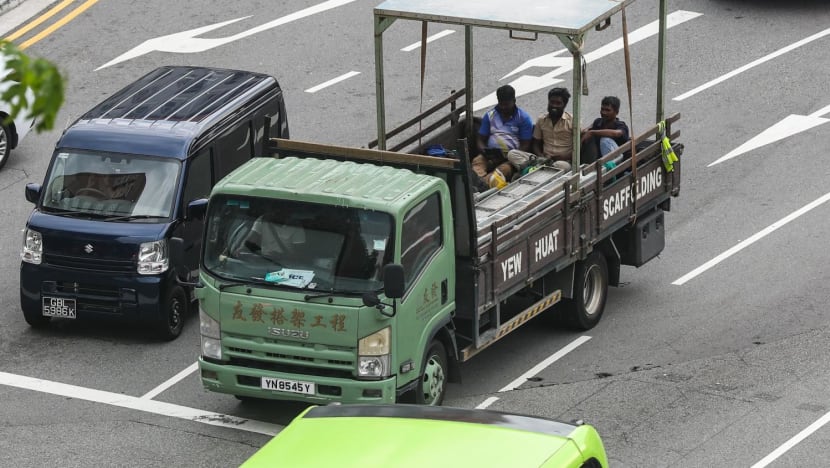Injuries involving people on lorries sharply decline, but MPs continue to urge Govt to ensure workers' transportation safety

SINGAPORE — Though the average number of people who have been injured while travelling on board lorries has fallen sharply, Members of Parliament (MPs) on Wednesday (Aug 2) continued to urge the Government to do more to protect workers, who primarily use lorries as their mode of transport.
Senior Minister of State for Transport Amy Khor told the House that the average number of fatalities from road traffic accidents involving persons on board lorries had halved from around six per year from 2013 to 2017, to around three per year from 2018 to 2022.
Meanwhile, the average number of injured persons on board lorries has also been reduced by about a third in the same period.
She was responding to parliamentary questions filed by Mr Louis Ng, MP for Nee Soon Group Representation Constituency (GRC).
Dr Khor said that while the Government recognises it is “not ideal” for workers to be transported on lorries, it also “understands the genuine concerns from employers”.
She highlighted a joint statement issued on Tuesday by 25 business bodies in response to advocacy groups’ call in July for a timeline to ban the practice of transporting workers on the back of lorries.
“The employers stated that if the Government imposes a ban, many companies — especially small and medium enterprises — will not be able to continue operating their businesses,” said Dr Khor.
She added that should these companies close down, there would be “knock-down effects” on society, including delays affecting new housing projects, polyclinics and MRT lines, as well as “higher costs all round for Singaporeans”.
These companies’ employees, which consist of both locals and migrant workers, she said, would also risk losing their jobs.
Nevertheless, Dr Khor added that the Government would continue to roll out measures that will also address “a multitude of factors behind accidents”, such as driving behaviour and vehicle speed, adding that the Ministry of Transport (MOT) is working closely with relevant government agencies on this.
She added that more details on these measures, including a requirement for lorries to be fitted with speed management devices, will be announced by the Ministry of Home Affairs later in the year.
MPs CALL FOR NEW WORK GROUP, SUBSIDIES
In response, two MPs posed supplementary questions suggesting that the Government considered setting up a new work group, provide funds and subsidies to companies, and look into interim measures to protect workers.
Mr Ng of Nee Soon GRC asked MOT to consider setting up a new work group comprising companies — including small- and medium-sized enterprises (SMEs) and non-profit organisations (NGOs) — with the aim of discussing whether there should be a timeline towards the ban of transporting workers on the back of lorries.
Mr Ng highlighted two accidents involving lorries carrying workers that occurred a week after his adjournment motion — which renewed a call to ban the use of lorries for transporting workers — was delivered in Parliament in July. The two accidents left 37 workers injured.
“As President Halimah (Yacob) has said in this house 14 years ago when she was an MP here, we’re talking about the lives and limbs of workers. Fourteen years later, we’re still discussing how to resolve this problem," said Mr Ng.
“Deputy Speaker Christopher De Souza had then, 14 years ago, also asked whether we would legislate to mandate that employers transport workers on buses.
“So I really hope that we can have a greater sense of urgency — not an immediate ban, but bearing in mind that we’ve talked about this for 14 years now,” he added.
Mr Ng also asked if MOT could consider providing funding or subsidies to companies to ease this transition to safer modes of transport.
“I understand the constraints the SMEs face, and I think the Government can provide a helping hand to them, and also help the workers at the same time,” he added.
To this, Dr Khor reiterated the “real, practical and operational constraints” faced by companies, adding that the Government is, regardless, working closely with the industry and its stakeholders to look into additional measures for improving workers’ safety.
“The statistics itself shows that there has been impact, and there has been improvement in terms of the number of injuries and fatalities of workers being transported on board lorries.”
She added that the Government would continue to look at measures that can be implemented, “where feasible and effective”.
On the call for a timeline, Dr Khor added: “There are challenges, practical constraints and difficulties, and therefore it is really not meaningful to talk about a timeline.”
Mr Melvin Yong, MP for Radin Mas Single Member Constituency, added that the National Trades Union Congress (NTUC) was “equally concerned” with the risks of ferrying workers on the back of lorries, and that he echoed Mr Ng’s suggestion for a work group, which “NTUC will be very happy to be a part of”.
Mr Yong also asked if MOT would consider an interim measure to prohibit the carrying of equipment with passengers on board the lorries at the same time — adding that he believes the practice would cause a higher risk of injuries and fatalities in the event of an accident.
Responding to this, Dr Khor highlighted the existence of an inter-agency work group, and added that while there were “difficulties and operations constraints”, the Government would continue to look into the suggestions.
Acknowledging the existing inter-agency work group, Mr Ng said: “I think the call now is for a new work group that will comprise the agencies together with the companies, the SMEs and the NGOs, and NTUC as well.”
“I think (in) looking at this with a new lens, (we) might be able to come up with different solutions.”













